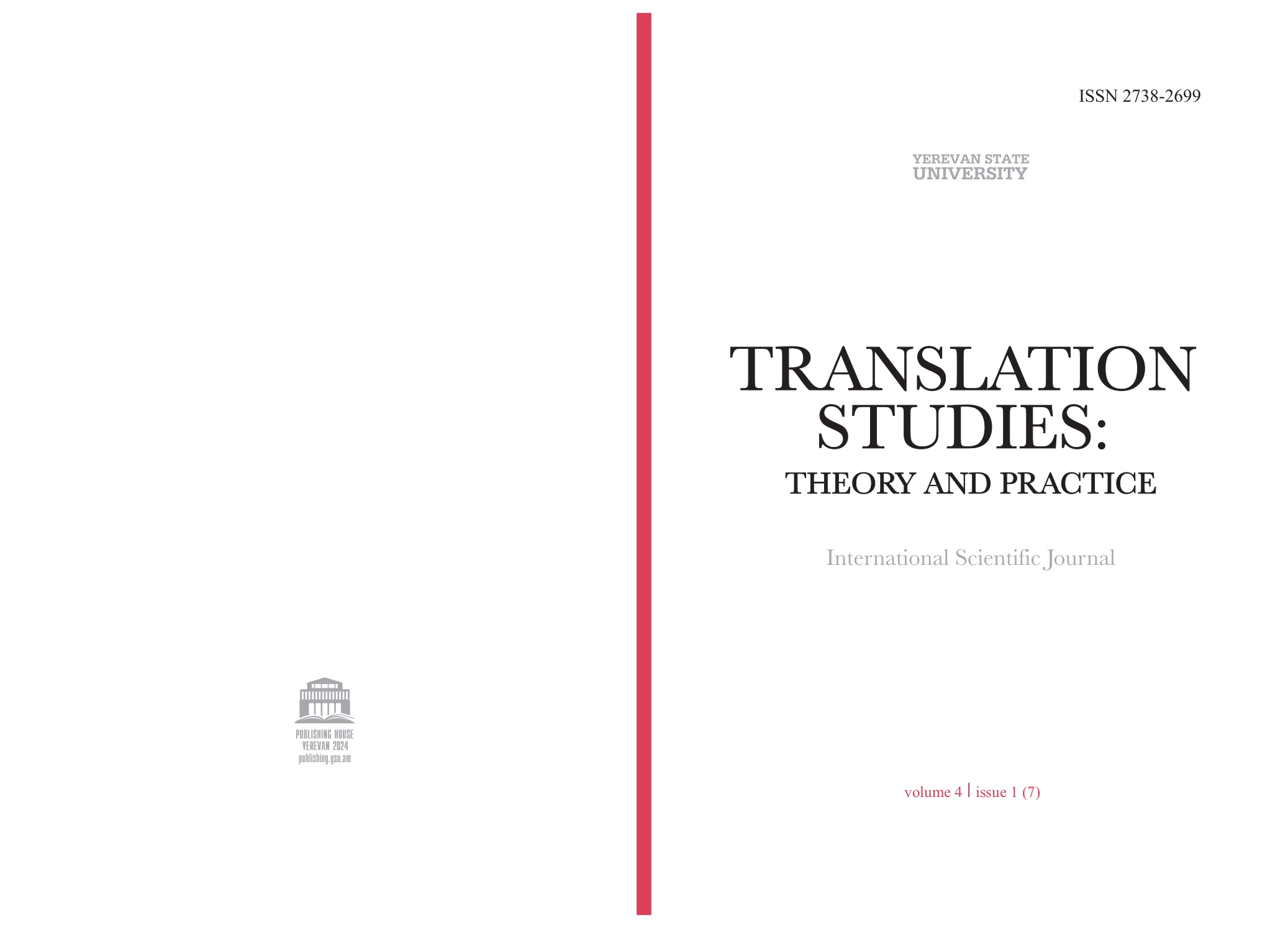Methods of Translating Non-Russian Proper Nouns Employed in Russian Texts
DOI:
https://doi.org/10.46991/TSTP/2024.4.1.109Keywords:
proper nouns, Russian translation into Italian, transliteration, Victoria Lomasko, intermediary translationAbstract
The present article deals with proper noun (PN) translation concentrating on the issue of non-Russian PNs employed in Russian texts. While the Italian translation tradition has in general opted for the method of transliteration of all PNs from Russian Cyrillic regardless of the name origins, a decolonizing approach would be that of considering non-Russian PNs as ‘translated’ terms from a third language. This approach will prove useful in expanding our understanding of how translation (and transliteration) may influence the perception of specific cultural and ethnic contexts embedded within source texts. In this article, examples of Kyrgyz, Armenian, Georgian, Azeri, and Belarusian PNs (from Victoria Lomasko’s The Last Soviet Artist) are provided. Avoiding intermediary translation (transliteration) from Russian Cyrillic, the translator (and author of this article) decided to reconstruct the original PNs encountered in the source text. The article thus discusses the reasons for the employment of such method when approaching PNs that are ‘mediated’ in the context of the source text, showing how this helps in decolonizing translation.
References
Azhniuk, Bohdan, and Azhniuk, Lesia. 2014. “Translating Personal Names in the USSR Successor States: Cross-Cultural and Sociolinguistic Perspectives.” Onomàstica. Biblioteca Tècnica de Política Lingüística, 256-260.
Ballard, Michel. 2001. Le nom propre en traduction [The Proper Noun in Translation]. Paris: Ophrys.
Batchelor, Kathryn (Ed.). 2009. Decolonizing Translation. Francophone African Novels in English Translation. Manchester: St. Jerome.
Crisp, Simon. 1985. “The Formation and Development of Literary Avar.” In Sociolinguistic Perspectives on Soviet National Languages. Their Past, Present and Future, edited by Isabelle T. Kreindler. Berlin – New York – Amsterdam: Mouton de Gruyter, 143-162.
Lomasko, Victoria. 2022. Altre Russie. Un reportage illustrato [Other Russias. An Illustrated Reportage]. Padova: BeccoGiallo.
Lozano Miralles, Helena. 2001. De los nombres propios y su traducción [About Proper Nouns and Their Translation]. Madrid: Entreascuas.
Napolitano, Martina. 2021. “I ritratti di testimonianza di Viktorija Lomasko [Victoria Lomasko’s Witness Portraits].” Slavica Tergestina 27: 272-291.
Newark, Peter. 1981. Approaches to Translation. Oxford: Pergamon Press.
Salmon, Laura. 2002. Lichnoe imya v russkom yazyke. Semiotika, pragmatika perevoda [The Proper Noun in Russian Language. Semiotics, Pragmatics of Translation]. Moskva: Indrik.
Salmon, Laura. 2003. “L’antroponimia russa: semiotica, pragmatica, traduzione (1) [Russian Anthroponymy: Semiotics, Pragmatics, Translation (1)].” Quaderni di semantica 48: 278-332.
Salmon, Laura. 2004. “L’antroponimia russa: semiotica, pragmatica, traduzione (2) [Russian Anthroponymy: Semiotics, Pragmatics, Translation (2)].” Quaderni di semantica 49: 39-103.
Salmon, Laura. 2006. “La traduzione dei nomi propri nei testi finzionali. Teorie e strategie in ottica multidisciplinare [The Translation of Proper Nouns in Fiction. Theory and Strategies in a Multidisciplinary Approach].” In I Nomi nel tempo e nello spazio [Proper Nouns in Time and Space], edited by Maria Giovanna Arcamone, Donatella Bremer, Davide De Camilli, Bruno Porcelli. Pisa: ETS, 77-91.
Superanskaya, Aleksandra. 1973. Obshchaya teoriya imeni sobstvennogo [General Theory of the Proper Name]. Moskva: Nauka.
Uspensky, Boris. 1994. “Sotsial’naya zhizn’ russkikh familiy” [The Social Life of Russian Surnames]. In Russkie familii [Russian Surnames], Boris Unbegaun. Moskva: 336-364.
Venuti, Lawrence. 1998. The Scandals of Translation. London-New York: Routledge.
Viezzi, Maurizio. 2004. Denominazioni proprie e traduzione [Proper Nouns and Translation]. Milano: LED.
Viezzi, Maurizio. 2017. “Toponimi, traduzione e il caso westö [Toponyms, Translation and the Westö Case].” Settentrione. Rivista di studi italo-finlandesi 29: 101-109.
Vinogradov, Venedikt. 2001. Vvedenie v perevodovedenie [Introduction to Translation Studies]. Moskva: Izdatel’stvo instituta obshchego srednego obrazovaniya RAO.
Downloads
Published
How to Cite
Issue
Section
License
Copyright (c) 2024 Martina Napolitano

This work is licensed under a Creative Commons Attribution-NonCommercial 4.0 International License.










